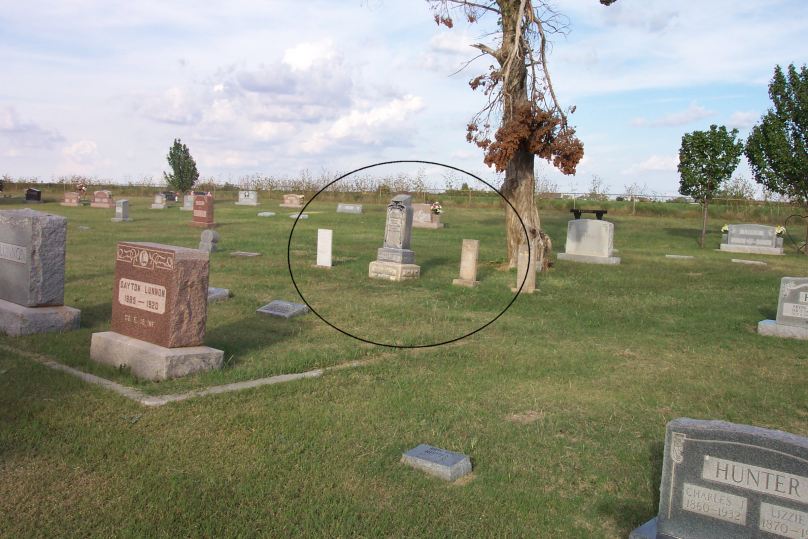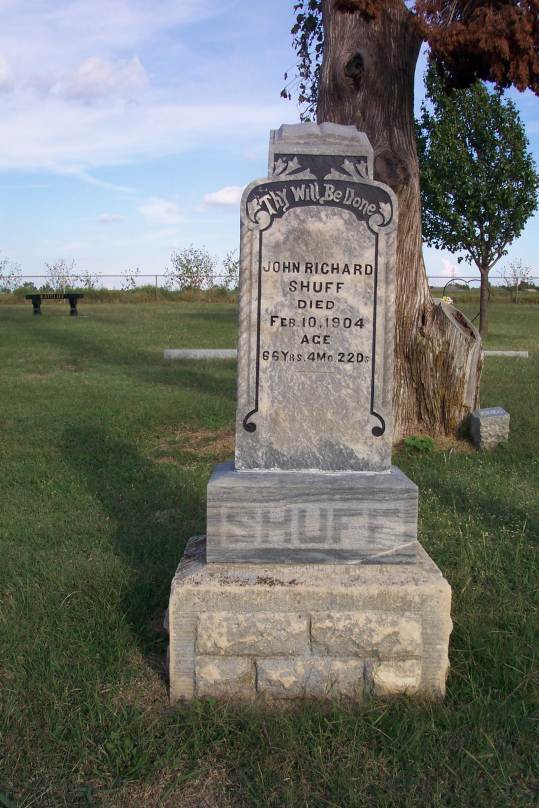John Richard Shuff
1837-1904
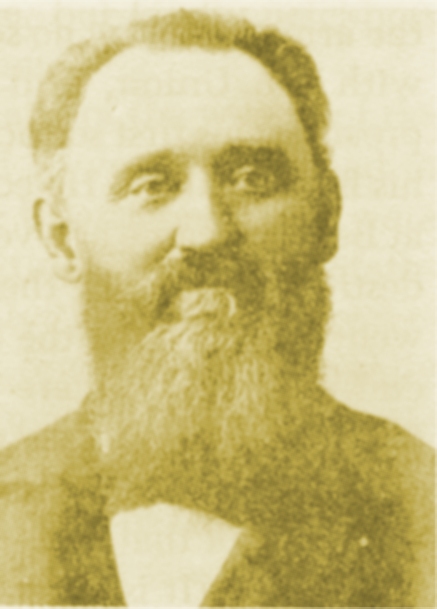
Biographical Sketch On The Life Of J. R. Shuff
J. R. Shuff was born in 1837, about the time of Harding, Brents, Garfield. and McGarvey. Thus he belongs to a period much earlier than most of the men we write about. We are happy to have this information volunteered by Sister Geneva Meredith, of Elkhart, Kansas, a grand daughter of Brother Shuff. In his early years the Millennial Harbinger was a potent force among the brethren, and he sometimes made reports to it, as well as to the Christian Leader, the Primitive Christian, the Octagraphic Review, and in later years to the Firm Foundation. During his life time the Missionary Society and Instrumental Music questions arose and were largely settled by division. Most of his work was in Illinois, Missouri, Iowa, Kansas, and Oklahoma. In much of this area the "Society forces" were very strong. There is no indication that he was ever tempted to submit to them.
John Richard Shuff was born September 18, 1837 at Jacksonville, Illinois, not a great distance Southwest of Springfield. His father was John W. Shuff, a native of Scott county, Kentucky. Scott county joins Bourbon county, horse of Barton W. Stone, on the West. Under the influence of such men they became members of The Lords body in very early times. Brother Shuff often related how Stone, Benjamin Franklin, and other gospel preachers often visited in his father's home. His mother was Angelina Lindsey a native of Carrot county, Virginia, whose parents had moved to Illinois. His father was a farmer, and evidently a rather prosperous one. He was a faithful Christian and brought his large family up in "the nurture and admonition of The Lord." In 1831 he moved from Kentucky to Morgan county, Illinois, where he bought a farm five and a half miles East of Jacksonville.
At the age of seventeen Brother Shuff obeyed the gospel under the preaching of Wm. A. Mallory in 1854. He attended the available schools, and then attended Berean College, Jacksonville, Illinois for two years, beginning in 1856. We do not know the level of the work done there, but following this he enrolled in Bethany College (founded by Alexander Campbell in West Virginia in 1841) in 1858. He continued his studies here until the outbreak of the Civil War in 1861. Due to poor health he was not drafted into the army, and saw no service in that war, But his sympathies were with the Union, and he voted for Lincoln. In 1857 he had preached his first sermons at Virginia in Cass county, just North of his home county. He continued to preach as he was able. His stay at Bethany came at a very interesting time, for the famous fire had destroyed much of the College property just the year before he went there. When the fire came, many thought the school would end, but classes were missed only one day. Though Alexander Campbell was getting old, he and Professor Pendleton were soon on the road raising funds with which to rebuild, and "Old Main," the result of that labor still stands on the Bethany campus, and is still in use.
On December 24, 1863, he was married to Elizabeth Ann Artt, with whom he had been acquainted for a number of years. She was a native of Kentucky, but with her parents had moved to Morgan country when she was quite young. Eight sons and five daughters were born to them. Several of these died in infancy and childhood, thus they knew first hand the sorrows most people have to face. After his return from Bethany he farmed, taught school, preached, led singing, and wrote poetry. In 1865 he moved from Illinois to Nodaway county, Missouri, (in the Northwest corner of the state) where he again farmed, preached, and carried on as before. He lived here for about ten years when financial difficulties forced him to sell his farm, and for a time he rented land and moved several times, the last move being to Taylor county in Iowa. In 1885 he moved to Hodgeman county, Kansas, just North of Dodge City, where he planned "to grow up with the country." But due to drought and similar problems, the country didn't grow much. Their first year in Kansas was the year of the famous blizzard of '85. On the first of January of this year, the Wichita Eagle Beacon carried a story on the ninety first anniversary of that blizzard. It tells that the summer of '85 had been so dry no crops were made. The blizzard started the afternoon of December 31, 1884, he following day the wind turned to the North, and by the next morning it was twenty below in Dodge City. With the poor houses the people had, they were ill prepared for such a storm. There was very little timber in the country, so fuel was scarce, and it is estimated that as many as three hundred people perished, along with thousands of animals. Sister Meredith sent an article about this that her mother had written, and which she sold to a number of papers and magazine. Brother Shuff and one of his sons were away from home when the blizzard came, but kindly neighbors looked after his family that was left at home.
For some years he had heard fabulous tales of the wealth of the Oklahoma Territory and often thought if it was ever opened to white settlement, he would go there. The Unassigned lands were opened in 1889 and he "made the run," getting a claim near Mathewson, now Piedmont, in Canadian county. Like most other settlers, they lived in a sod house the first few years, but finally through eternally hard work, frugal living, and good management, they were able to build a better house. Sister Shuff inherited some money, and they bought a quarter section of land adjoining their claim. This was a good farming area, and was "home" for the rest of their lives.
Like most preachers of his time, he never did "local work," but preached in gospel meetings and in such public places as were available. Most of the meetings were held in the winter months when farm work was at a minimum. Most of the congregations were small and very few owned a meeting house. Often the people of a church that had managed to build a meeting house, would let other religious bodies use it. There was no such thing as a "salary" for the preacher. The people were very poor, for money was very scarce, but the people did extend freely the hospitality of their homes, and would share such things as the farm produced with the preacher and his family. When the preacher was away in meeting work, brethren and neighbors would usually attend to any special need that arose in the preacher's family. (Pioneer people were good, thoughtful, kind...) Preachers of his time had to fight for every inch of ground they gained from the forces of religious error, and so debates were quite common. The family has a record of one debate Brother Shuff had with a Presbyterian, and thinks that there were other debates. A legible, hand written tract of 238 pages is in possession of Sister Meredith. It is a reply to a "Tract on Good Friday" by B. Atkins, and so far as she knows it was never published. She is saving it for Ralph Hunter, great grandson of Brother Shuff, who is now preaching the gospel in Australia, but expected home soon. In his lifetime the controversy over the Missionary Society and Instrumental Music was in progress, and the "digressives" managed to get control of most of the property the brethren had. Faithful brethren were thus often forced out of property they had paid for, and just simply had to do the best they could. Preachers took all kinds of stands on these issues, but there is no indication Brother Shuff ever "wobbled on the line," in fact, the contrary seems to have been the case, for in the February 25, 1896 issue of the Christian Leader is found the following statement about him: "He has always been uncompromising with all perverts of the gospel."
All his children and their mates were faithful and active Christians. I have a record that shows that four of his sons served as elders in The Church. Four, including the three of the elders, were song leaders, others, along with their wives, are spoken of as "excellent Bible teachers." Numbers of them were involved in in the establishment of The Church in Kansas and in California. Two of his grandsons were gospel preachers, two were elders, three were song leaders, and others were good Bible teachers, and this pattern continues down through the grandchildren to the great grand children of the present. It is to be regretted that we do not know more details of his work, for he lived and worked in a very important and interesting period, and led many souls to The Lord. His family says more about him than we could possibly write, for it reminds me of a statement Jehovah made about Abraham: "For I have known him to the end that he may command his children and his household after him, that they may keep the way of Jehovah, to do righteousness and justice..." Genesis 18:19.
Like most great and good men, Brother Shuff had a faithful companion that walked by his side through all the years, providing the strength that comes only from such a source. She is described as one who was "always calm and with a soft speaking voice."
In 1904 he developed "blood poisoning" from an accident on the farm, and did not recover. His companion continued until 1923. Their bodies sleep in the good Oklahoma soil in the Mathewson Cemetery at Piedmont. We enjoy helping preserve the memory of such people. May The Lord continue to bless their memory and their descendants.
- Gospel Preachers Of Yesteryear, Loyd L. Smith, page 311-314
![]()
Location Of The Grave Of J. R. Shuff
GPS Coordinates of the Grave
35°40'13.7"N 97°47'51.8"W
or D.d. 35.670483, -97.797733
Mathewson Cemetery, Piedmont, Oklahoma
Directions: In Oklahoma City. Take Hwy 44 to Exit 125 North. Head northeast on Hwy 3 (Northeast Expressway) and travel 12.81 miles. When you pass under the John Kilpatrick Turnpike you will still have another 3.6 miles to go. When you get to Hwy 4 (Piedmont Rd.) turn right and head north. Travel through the town of Piedmont 4.25 miles and turn left on Arrowhead St./192nd and travel 3 miles. Turn right on Richland Rd. and travel 1/4 mile to the Mathewson Cemetery. Pull up in front of the cemetery's center gate and park. Go in the center gate and head toward the rear of the cemetery. Look just to the left.
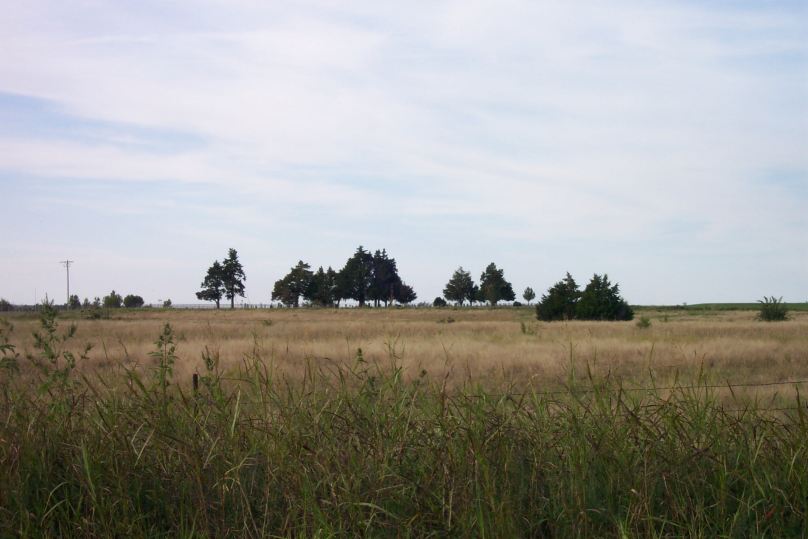
See The Mathewson Cemetery Off In The Distance
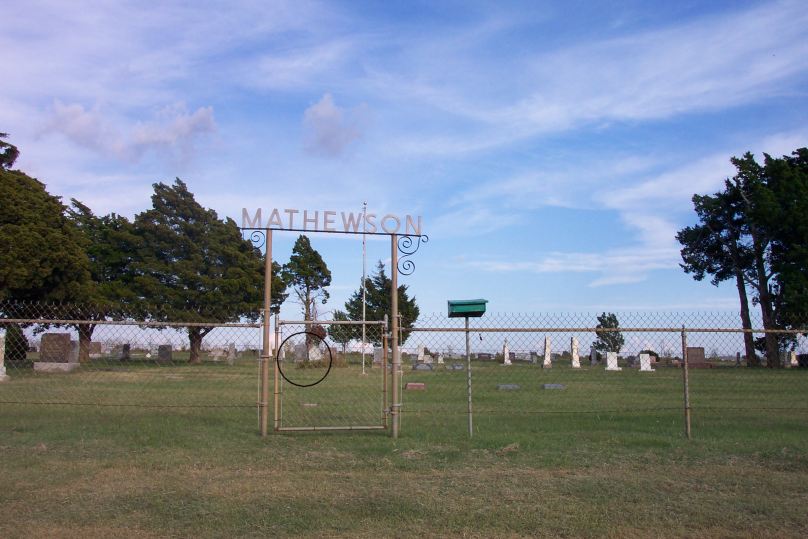
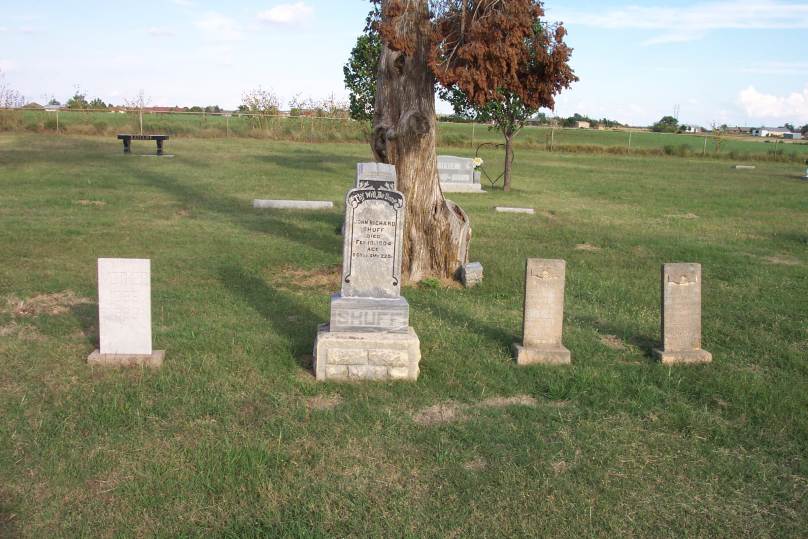
Another Link Revealing Information On J. R. Shuff
![]()
